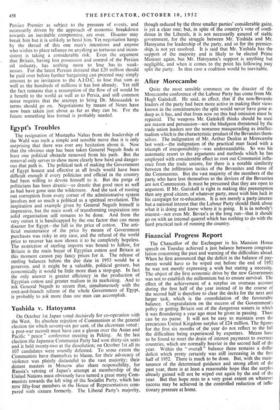After Morecambe
Quite the most sensible comment on the disaster of the Morecambe conference of the Labour Party has come from Mr. Hugh Gaitskell. He said, in effect, that if the non-Bevanite leaders of the party had been more active in making their views known in the constituencies the split would never have gone as deep as it has, and that from now on this bad omission must be repaired. The weapons Mr. Gaitskell thinks should be used are reason and persuasion—not the bludgeon threatened by the trade union leaders nor the nonsense masquerading as intellec- tualism which is the characteristic productbf the Bevanites them- selves. The indignation of Mr. Arthur Deakin at Morecambe last week—the indignation of the practical man faced with a triumph of irresponsibility—was understandable. So was his automatic resort to the arguments and methods which he has employed with considerable effect to root out Communist influ- ence from the trade unions, for there is a notable similarity between the infiltration tactics of the Bevanites and those of the Communists. But the vast majority of the members of the party, who have lent themselves to the devices of the Bevanites are not Communists. It must be presumed that they are open to argument. If Mr. Gaitskell is right in making this presumption then any good citizen, of whatever party, must wish him luck in his campaign for re-education. It is not merely a party-interest but a national interest that the Labour Party should think about what it is doing and know where it is going. It is in nobody's interest—not even Mr. Bevan's in the long run—that it should go on with an internal quarrel which has nothing to do with the hard practical task of running the country. '


































 Previous page
Previous page